动名词做主语和宾语的用法及练习20140523162450
动名词作主语和宾语

【考例】
1. I can't imagine __________ that with them.
A. do
B. to do
C. being done D. doing
2. She looks forward every spring to __________ the flower-lined garden.(1995 上海高考题)
• 归纳:常用-ing形式作主语的句型有: • It +be +a waste of time doing • 做……是浪费时间的 • It is/was no good/use doing • 做……是没益/用处的 • It is/was hardly/scarcely worth doing • 做……不值得 • It is/was worth/worthwhile doing • 做……是值得的 • There is no doing • 无法…… , 不允许……
13. You must pay attention to ___ the
works of Lu Xun.
A. read
B. reading
C. reader D. be read
14. You should work tonight instead of
_____ TV.
A. to watch B. you watching
A. study
B. be studied
C. studying
D. have studied
12. We are both looking forward to __ next week. A. going on vocation(休假) B. go on vocation C. be going on vocation D. have gone on vocation
动名词的用法及常见搭配解析
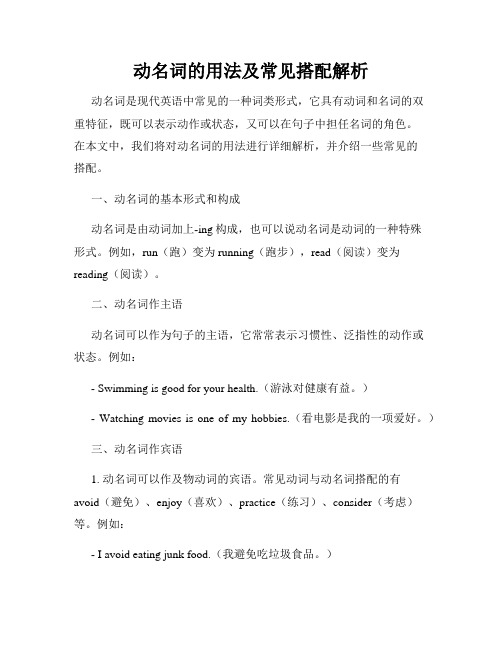
动名词的用法及常见搭配解析动名词是现代英语中常见的一种词类形式,它具有动词和名词的双重特征,既可以表示动作或状态,又可以在句子中担任名词的角色。
在本文中,我们将对动名词的用法进行详细解析,并介绍一些常见的搭配。
一、动名词的基本形式和构成动名词是由动词加上-ing构成,也可以说动名词是动词的一种特殊形式。
例如,run(跑)变为running(跑步),read(阅读)变为reading(阅读)。
二、动名词作主语动名词可以作为句子的主语,它常常表示习惯性、泛指性的动作或状态。
例如:- Swimming is good for your health.(游泳对健康有益。
)- Watching movies is one of my hobbies.(看电影是我的一项爱好。
)三、动名词作宾语1. 动名词可以作及物动词的宾语。
常见动词与动名词搭配的有avoid(避免)、enjoy(喜欢)、practice(练习)、consider(考虑)等。
例如:- I avoid eating junk food.(我避免吃垃圾食品。
)- He enjoys playing basketball.(他喜欢打篮球。
)2. 动名词可以作介词的宾语。
常见介词与动名词搭配的有think about(思考)、look forward to(期待)、worry about(担心)等。
例如:- I'm thinking about changing my job.(我正在考虑换工作。
)- She is looking forward to visiting Paris.(她期待着去巴黎旅行。
)四、动名词作补语动名词还可以作及物动词的宾语补足语,表示完成或结果。
常见动词与动名词搭配的有find(发现)、keep(保持)、leave(离开)等。
例如:- I found her crying in the room.(我发现她在房间里哭泣。
动名词作主语和宾语

05 动名词作主语和宾语的练 习与巩固
单项选择题
总结词
考察动名词作主语和宾语的辨析能力
详细描述
提供一系列单项选择题,要求选择正确的动名词短语作为主语或宾语,以检验学生对动名词作主语和宾语的掌握 程度。
填空题
总结词
考察动名词作主语和宾语的运用能力
要点二
语义重点
动名词在作主语时,强调的是整个动 作或行为本身;而在作宾语时,强调 的是动作或行为的对象或结果。
要点三
使用频率
在实际语言使用中,动名词作主语的频 率相对较高,尤其是在一些固定表达和 习惯用法中,如“Smoking is harmful to health.(吸烟有害健 康。)”中的“Smoking”就是主语。 而宾语则相对较少使用动名词,更多地 使用其他类型的宾语,如名词、代词等。
详细描述
给出句子,要求填写合适的动名词短语作为主语或宾语,以检验学生能否在实际语境中 正确运用动名词作主语和宾语。
翻译题
总结词
考察动名词作主语和宾语的翻译技巧
详细描述
提供一段英文句子,要求将其中的动名词短 语翻译成中文,并保持原意不变,以检验学 生对动名词作主语和宾语的翻译能力。
THANKS FOR WATCHING
习惯用法
习惯用法是指某些动词在特定语境下 习惯性地使用动名词形式。例如, “He recommended me buying a new car”中,“buying a new car”是习惯用法,表示“他建议我 买一辆新车”。
VS
习惯用法通常与特定的动词或短语相 关,反映了语言使用者的习惯和约定 俗成的表达方式。
动名词做主语
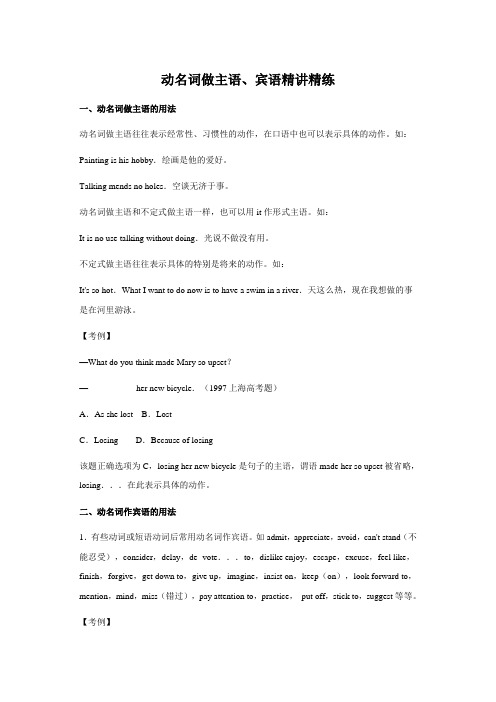
动名词做主语、宾语精讲精练一、动名词做主语的用法动名词做主语往往表示经常性、习惯性的动作,在口语中也可以表示具体的动作。
如:Painting is his hobby.绘画是他的爱好。
Talking mends no holes.空谈无济于事。
动名词做主语和不定式做主语一样,也可以用it作形式主语。
如:It is no use talking without doing.光说不做没有用。
不定式做主语往往表示具体的特别是将来的动作。
如:It's so hot.What I want to do now is to have a swim in a river.天这么热,现在我想做的事是在河里游泳。
【考例】—What do you think made Mary so upset?— __________ her new bicycle.(1997上海高考题)A.As she lost B.LostC.Losing D.Because of losing该题正确选项为C,losing her new bicycle是句子的主语,谓语made her so upset被省略,losing...在此表示具体的动作。
二、动名词作宾语的用法1.有些动词或短语动词后常用动名词作宾语。
如admit,appreciate,avoid,can't stand(不能忍受),consider,delay,de- vote...to,dislike enjoy,escape,excuse,feel like,finish,forgive,get down to,give up,imagine,insist on,keep(on),look forward to,mention,mind,miss(错过),pay attention to,practice,put off,stick to,suggest等等。
动名词作主语用法

动名词作主语用法
动名词是动词加上-ing 后缀构成的名词形式,它可以在句子中充当主语。
以下是动名词作主语的用法:
●基本用法:
例句:Swimming is a great form of exercise.(游泳是一种很好的锻炼方式。
)
例句:Reading books is one of her favorite pastimes.(阅读书籍是她最喜欢的消遣之一。
)
●表示一般行为或活动:
例句:Cooking can be a relaxing and enjoyable activity.(烹饪可以是一种轻松愉快的活动。
)例句:Skiing requires a good sense of balance.(滑雪需要良好的平衡感。
)
●用于表达喜好或爱好:
例句:Dancing brings her a lot of joy.(跳舞给她带来很多快乐。
)
例句:Playing the guitar is something he enjoys in his free time.(弹吉他是他在空闲时间喜欢做的事情。
)
●与"it" 结合使用:
例句:It takes patience to master a new language.(掌握一门新语言需要耐心。
)
动名词作为主语时,常常需要注意其与动词形式的用法区别,以及它所表示的是一种抽象的行为或活动。
在句子中,动名词可以提供更加具体和实际的描述,使语言更加生动。
动名词作主语和宾语

14. I remembered ____ A this person
somewhere before. A. seeing C. seen be crying now. A. having said C. to say B. to have said D. said B. having been seen D. to see
C 9. The story was so funny that we ___.
A. couldn’t help laugh
B. can’t but laugh C. couldn’t help laughing D. couldn’t help but to laugh
10. Though it sounds a bit too dear, it is worth ______. B A. being bought B. buying C. to buy D. buying it 11. He devoted his life to _____ C the atomic theory. A. study B. be studied C. studying D. have studied
Li Hua’s passing the exam made her very happy. He insisted on my/me reading it.
I want my bike repairing .
1)作主语 Mary`s coming late made her teacher angry. 玛丽来晚了,这使得她的老师很生气。
16
动名词的时态和语态 1)构成:动名词没有人称和数的变化,但有 时态和语态的变化。动名词的时态分一般式 和完成式两种,语态分主动形式和被动形式。 具体如下: 一般式的主动语态:doing 一般式的被动语态: being done 完成式的主动语态:having done 完成式的被动语态: having been done
动名词用法总结
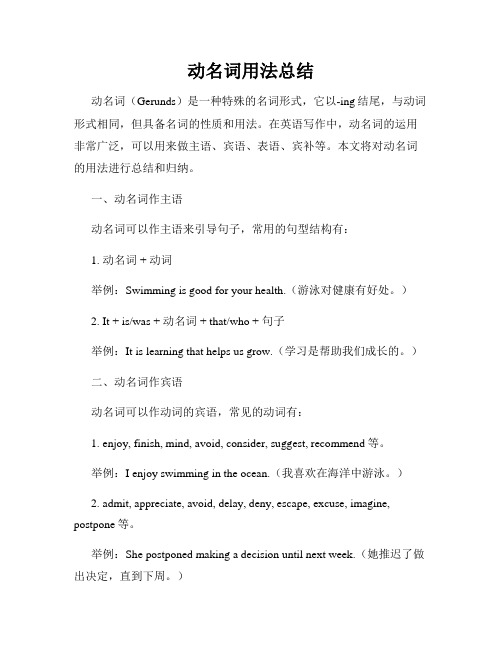
动名词用法总结动名词(Gerunds)是一种特殊的名词形式,它以-ing结尾,与动词形式相同,但具备名词的性质和用法。
在英语写作中,动名词的运用非常广泛,可以用来做主语、宾语、表语、宾补等。
本文将对动名词的用法进行总结和归纳。
一、动名词作主语动名词可以作主语来引导句子,常用的句型结构有:1. 动名词 + 动词举例:Swimming is good for your health.(游泳对健康有好处。
)2. It + is/was + 动名词 + that/who + 句子举例:It is learning that helps us grow.(学习是帮助我们成长的。
)二、动名词作宾语动名词可以作动词的宾语,常见的动词有:1. enjoy, finish, mind, avoid, consider, suggest, recommend等。
举例:I enjoy swimming in the ocean.(我喜欢在海洋中游泳。
)2. admit, appreciate, avoid, delay, deny, escape, excuse, imagine, postpone等。
举例:She postponed making a decision until next week.(她推迟了做出决定,直到下周。
)三、动名词作表语动名词可以作表语,常与be动词连用,表示主语的特征或状态。
举例:Her hobby is painting.(她的爱好是绘画。
)举例:My dream is traveling around the world.(我的梦想是环游世界。
)四、动名词作宾补在某些动词后面,可以加上动名词作宾补来表示动作的完整性。
常见的动词有:see, watch, hear, feel, notice, observe等。
举例:I saw him crossing the street.(我看到他穿过马路。
教资动名词做主语

教资动名词做主语一、动名词的概念动名词是由动词原形加 -ing构成,它既有动词的特征,又有名词的特征。
在句子中可以充当主语、宾语、表语等成分。
例如:“Swimming is my favorite sport.”(swim是动词,swimming就是动名词,在句中作主语)二、动名词做主语的用法1. 直接作主语- 表示抽象的、一般性的行为。
- 例如:Reading enriches the mind.(读书使人充实)这里的reading就是动名词,它表示“读书”这个抽象的行为,而不是具体某一次的读书动作。
- 再如:Running is good for your health.(跑步对你的健康有益)running 作为动名词,代表“跑步”这个普遍概念。
2. 动名词短语作主语- 动名词短语是由动名词加上其本身的宾语或者状语等构成的。
- 例如:Getting up early every day makes me energetic.(每天早起使我精力充沛)这里“Getting up early every day”是动名词短语,其中“up”是动名词“getting”的宾语,“early every day”是状语,这个动名词短语在句中作主语。
三、动名词作主语时的主谓一致1. 单个动名词作主语时,谓语动词用第三人称单数形式。
- 例如:Seeing is believing.(眼见为实)句中的“is”是与动名词“seeing”和“believing”相匹配的,因为单个动名词作主语,谓语要用单数。
2. 由and连接的两个动名词作主语时,如果表示的是两件不同的事情,谓语动词用复数形式;如果表示的是同一件事情或一个概念,谓语动词用单数形式。
- 例如:- Reading books and watching movies are my hobbies.(读书和看电影是我的爱好)这里“reading books”和“watching movies”是两件不同的事情,所以谓语动词用“are”。
动名词的用法总结

动名词的用法总结动名词是英语中一种特殊的词形,它由动词加上-ing构成。
动名词在句子中可以作主语、宾语、介词宾语、补语和定语等多种语法成分。
本文将对动名词的不同用法进行总结和分析。
一、动名词作主语动名词作主语时,常用于表达一种习惯性或普遍性的动作。
例如:1. Swimming is a good form of exercise.(游泳是一种很好的锻炼方式)2. Eating fruits and vegetables is good for your health.(吃水果和蔬菜对健康有益)二、动名词作宾语动名词作宾语时常用于以下情况:1. 作及物动词的宾语例:I enjoy playing basketball.(我喜欢打篮球)2. 作介词的宾语例:He is good at singing.(他擅长唱歌)三、动名词作介词宾语在介词后面,动名词作为宾语出现,常用于表示目的、原因、兴趣等情况。
例如:1. I went to the park for walking my dog.(我去公园遛狗)2. She apologized to her friend for making a mistake.(她对她的朋友道了歉,因为犯了一个错误)四、动名词作补语动名词可以作某些动词的补语,这些动词包括keep, catch, find, imagine等。
例如:1. I caught him stealing my money.(我抓到他偷我的钱)2. He found his cat sleeping on the sofa.(他发现他的猫在沙发上睡觉)五、动名词作定语动名词可以作修饰名词的定语,常出现在名词前面。
例如:1. The running water is so clear.(流动的水非常清澈)2. I saw a dancing girl on the stage.(我在舞台上看到了一个跳舞的女孩)总结:动名词可以作主语、宾语、介词宾语、补语和定语等多种语法成分。
(完整word版)初中动名词的用法
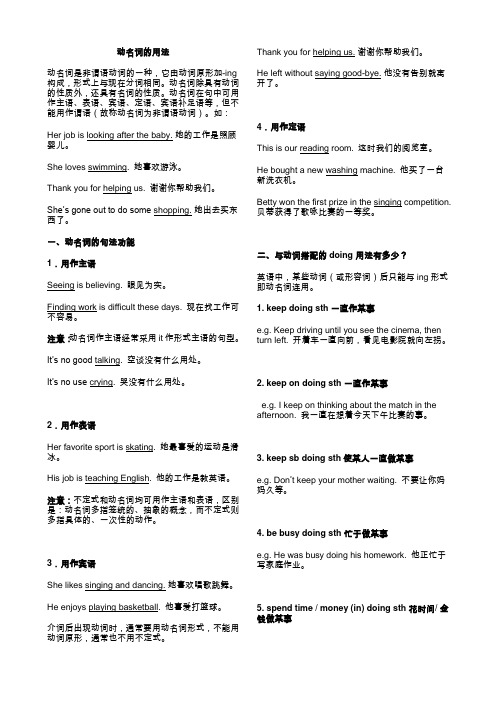
动名词的用法动名词是非谓语动词的一种,它由动词原形加-ing 构成,形式上与现在分词相同。
动名词除具有动词的性质外,还具有名词的性质。
动名词在句中可用作主语、表语、宾语、定语、宾语补足语等,但不能用作谓语(故称动名词为非谓语动词)。
如: Her job is looking after the baby.她的工作是照顾婴儿。
She’s gone out to do some shopping. 她出去买东西了。
一、动名词的句法功能1.用作主语Finding work is difficult these days. 现在找工作可不容易。
注意:动名词作主语经常采用it 作形式主语的句型。
2.用作表语Her favorite sport is skating.她最喜爱的运动是滑冰。
注意:不定式和动名词均可用作主语和表语,区别是:动名词多指笼统的、抽象的概念,而不定式则多指具体的、一次性的动作。
3.用作宾语介词后出现动词时,通常要用动名词形式,不能用动词原形,通常也不用不定式。
He left without saying good-bye. 他没有告别就离开了。
4.用作定语He bought a new washing machine. 他买了一台新洗衣机。
Betty won the first prize in the singing competition. 贝蒂获得了歌咏比赛的一等奖。
二、与动词搭配的doing 用法有多少?英语中,某些动词(或形容词)后只能与ing 形式即动名词连用。
1. keep doing sth 一直作某事e.g. Keep driving until you see the cinema, then turn left. 开着车一直向前,看见电影院就向左拐。
2. keep on doing sth 一直作某事e.g. I keep on thinking about the match in the afternoon. 我一直在想着今天下午比赛的事。
动名词做主语和宾语

动名词做主语和宾语动名词做主语和宾语第⼀部分动名词做主语①动名词直接置于句⾸主语的位置上。
往往表⽰经常性、习惯性的动作。
形式:doing1.玩⽕危险is dangerous.2 (read)aloud is very important in learning English.3. (找⼯作)is difficult these days.②⽤形式主语it,把真正的主语——动名词结构移置句尾。
牢记以下句型:It +be +a waste of time doing 做……是浪费时间的It is/was no good/use doing 做……是没⽤处的It is useless doingIt is/was worth/worthwhile doing 做……是值得的即学即练:1.It is a waste of time it. (争论)2.It is no use (等他)3.It is worthwhile _______________ (读⼀本好的⼩说)③there is no sense /point doing sththere is no good / use doingthere is nothing worse than doing sthThere is no need to do sth ⼲……没必要,在此句式中to do 不可换为doing.. 第⼆部分:动名词作宾语观察下列句⼦:1.Yuan longping enjoys listening to music ,swimming and reading.2.He does’t care about being famous.3.They focus on keeping their soil rich and free of disease./doc/877488823.htmlanic farmers prefer using natural waste from animals as fertilizer.(⼀).只能接动名词作宾语的动词avoid consider enjoy keep finish suggest envy dislike delay escape imagine mind miss practise lead tofocus on be fond of give up cannot stand get used to be worth pay attention to be good at devote to dream of feel like insist on look forward to常跟动词ing作宾语的动词歌诀:避免错过少延期建议完成多练习喜欢想象禁不住承认否定与嫉妒逃避冒险莫原谅忍受保持不介意即学活⽤:1.I often practise (speak) English.2.I can’t avoid (go)there with him.3.He decided (experiment) with scientific methods of farming.4.Tom looked forward to the film this weekend.(⼆) 有些动词既可后接动名词也可接不定式作宾语.(没⼤区别)1.⼀些表⽰喜好或开始动作的动词like,love,hate, prefer ,intend ,begin, start continue等,1)I started (work)here two years ago.2)I intended a poem in English.(write)3)They prefer (spend) their summer vacation in the country2. need/want/require/deserve doing sth.=need/want/require/deserve to be done4 ) The bike requires (repair)The bike requires .5 ) My hair needs (cut)My hair needs(三) 有些动词既可后接动名词也可接不定式作宾语。
动名词作宾语的用法和例句

动名词作宾语的用法和例句1.动名词可以跟在动词后面作宾语:Have you finished painting the windows?窗子漆好了没有?Would you mind shutting the door?劳驾把门关上好吗?He avoided talking about this.他避免谈这事。
She can’t help laughing at the words.听了这话,情不自禁笑了起来。
I enjoyed working here.我在这里工作很高兴。
Our house needs painting.我们的房子需要油漆。
能跟这种宾语的常见动词有suggest,stop,admit,delay,practice,excuse,deny,remember,hate,like,finish,begin,start,mind,fancy,miss,prefer,continue,propose,regret,deserve,can’t help,leave off,put off等。
2.有些动词可以用动名词作宾语,也可用不定式作宾语,意思没有太大差别:Do you like playing chess?你喜欢下棋吗?They began to talk about something else.他们开始谈别的事。
有时两者意思上有些差别:I remember seeing you somewhere.记得在哪里见到过你。
Remember to post the letter.记得把信发掉。
I regret not having accepted your advice.我后悔没听你的劝告。
I regret to say I won’t be able to join you.我遗憾地说我不能和你们一道去。
3.在like,hate,prefer等词后,表示一般倾向时多用动名词,如指某次行动,用不定式时更多一些。
动名词作主语的用法

动名词作主语的用法动名词是现在分词的一种形式,在句子中可以作为主语。
以下是动名词作主语的用法:1. 作为主语动名词可以作为句子的主语。
例如:- Swimming is good exercise.(游泳是一项很好的运动。
)- Running is his favorite hobby.(跑步是他最喜欢的爱好。
)2. 带有不定式的动名词动名词可以与不定式连用,表示一个动作或行为。
例如:- His goal is to learn to play the guitar.(他的目标是学会弹吉他。
)- My dream is to travel around the world.(我的梦想是周游世界。
)3. 带有介词的动名词动名词可以与介词搭配使用。
常见的介词有 for, in, on, at, with 等。
例如:- Thank you for helping me.(谢谢你帮助我。
)- She is interested in learning new languages.(她对研究新语言很感兴趣。
)- He is good at playing basketball.(他擅长打篮球。
)4. 带有名词性限定词的动名词动名词可以与名词性限定词连用,限定词可以是形容词或名词。
例如:- Her favorite activity is shopping.(她最喜欢的活动是购物。
)- The best part of traveling is experiencing new cultures.(旅行最好的一点是体验新的文化。
)动名词作为主语的用法具有灵活性和表达能力强的特点,可以用于描述各种不同的动作、行为和情况。
通过使用动名词作为主语,可以使句子更加生动和有趣。
动名词的用法
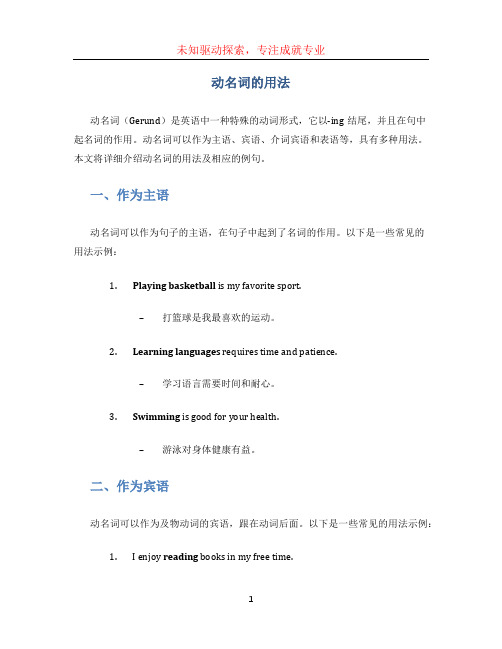
动名词的用法动名词(Gerund)是英语中一种特殊的动词形式,它以-ing结尾,并且在句中起名词的作用。
动名词可以作为主语、宾语、介词宾语和表语等,具有多种用法。
本文将详细介绍动名词的用法及相应的例句。
一、作为主语动名词可以作为句子的主语,在句子中起到了名词的作用。
以下是一些常见的用法示例:1.Playing basketball is my favorite sport.–打篮球是我最喜欢的运动。
2.Learning languages requires time and patience.–学习语言需要时间和耐心。
3.Swimming is good for your health.–游泳对身体健康有益。
二、作为宾语动名词可以作为及物动词的宾语,跟在动词后面。
以下是一些常见的用法示例:1.I enjoy reading books in my free time.–我空闲时喜欢读书。
2.They avoid eating junk food.–他们避免吃垃圾食品。
3.She prefers watching movies to going shopping.–她喜欢看电影而不是逛街。
三、作为介词宾语动名词可以作为介词的宾语,放在介词后面。
以下是一些常见的用法示例:1.He is good at playing the piano.–他擅长弹钢琴。
2.We are interested in learning new things.–我们对学习新事物感兴趣。
3.She is afraid of flying in airplanes.–她害怕坐飞机。
四、作为表语动名词可以作为系动词的表语,说明主语的身份或特征。
以下是一些常见的用法示例:1.Her favorite activity is painting.–她最喜欢的活动是绘画。
2.The best thing for you is relaxing.–对你来说最好的事情是放松。
- 1、下载文档前请自行甄别文档内容的完整性,平台不提供额外的编辑、内容补充、找答案等附加服务。
- 2、"仅部分预览"的文档,不可在线预览部分如存在完整性等问题,可反馈申请退款(可完整预览的文档不适用该条件!)。
- 3、如文档侵犯您的权益,请联系客服反馈,我们会尽快为您处理(人工客服工作时间:9:00-18:30)。
动名词做主语和宾语的用法及练习(2014-05-23 16:24:50)1.动名词(动名词具有动词和名词的特征,在句中作主语、表语、宾语和定语)动名词主动语态被动语态与谓语动词的关系一般式DoingBeing done与谓语动作同时发生完成式Having doingHaving been done动作发生在谓语动作之前作主语1. 谓语用单数。
Climbing mountains is really fun.Swimming is my favorite sport.Reading is an art.Getting up early is a good habit.例:1.-What do you think made Mary so upset?-___ her new bicycle.A. As she lost B.LostC.Losing D.Because of losing2. 使用形式主语it,而将动名词放在句尾。
It’s no use doing …It’s no good doing…It’s a waste of time doing …例:It’s no good______ (wait) here.It’s no use ______(argue) with her.It’s no good _______(smoke), you’d better give it up.It’s a waste of time _______(wait) here.No smoking ( =No smoking is allowed (here) ).作宾语I enjoy listening to music.He often practices playing the piano in the evening.He has given up smoking.Would you mind turning down your radio a little, please? 他不喜欢喝酒。
他充分利用时间练习唱歌。
我提议坐我的车去。
你介意我开窗吗?(1) 只能接动名词作宾语的动词:admit,advise建议,risk,appreciate,envy嫉妒,avoid避免,consider考虑,delay延迟,deny否认,dislike不喜欢,enjoy,escape逃避,excuse原谅、宽恕,finish完成,forgive原谅,understand理解,give up放弃,imagine想象,keep保持,mind介意、在乎,miss未达到,practice训练,put off推迟,resist抵抗,suggest建议、暗示,can’t help 禁不住,can’t stand无法忍受,devote to致力于···,look forward to 期望、盼望,stick to坚持,be used to习惯于,object to反对,be busy忙于···,feel like想要···,be surprised at 对……感到惊讶,be proud of 以……为骄傲,succeed in 在某方面成功,be afraid of害怕give up 放弃例: Our monitor suggested _____a discussion of this subject. (85’)A.to have B.should haveC.have D.Having(2) 只能接不定式作宾语的动词:happen 碰巧,offer 主动提出,promise 答应,agree 同意,refuse拒绝,decide 决定,determine 决定、决心,pretend 假装,fail 未能够,learn,wish希望,hope,expect,afford 负担得起。
(3) 接动名词、不定式均可,意义相同的动词:like,love,dislike,hate,begin,star,continue,prefer,can’t bear/endure 无法忍受,cease停止。
注1:v-ing形式表示经常性、概括性的动作,不定式表示具体的、特定的某一次动作。
如:She likes singing, but she doesn’t like to sing today.注2:在begin, start, continue后跟v-ing形式和不定式作宾语没有区别,但start,begin本身为进行式或后接realize, wonder, understand等心理活动的词时,常用不定式作宾语。
如:I began to realize that I was wrong.(4) 下列单词接动名词和不定式均可,但意义不同的动词:forget,go on,mean,regret,remember,stop,try等Stop to do 停下来去做stop doing 停止做Forget to do 忘记要做forget doing 忘记做过Remember to do 记得要做remember doing 记得做过Regret to do 遗憾要做regret doing 后悔做过Try to do 企图做,尽力做try doing 试着做Go on to do 继续做(另一件事)go on doing 继续做(同一件事)Mean to do 打算做mean doing 意味做例:1. In some parts of London, missing a bus means _______ for another hour.A waitingB to waitingC waitD to be waiting2.—You were brave enough to raise objections at the meeting.-Well,now I regret ___that.A.to do B.to be doingC.to have done D.having done(5) need, require, want作“需要”讲,其后用动名词的主动式表示被动意义,be worth 也有类似用法。
如:The flowers need watering/to be watered.The problem is worth discussing/to be discussed.(6) permit, allow, forbid, require(要求)doing sth./ sb to do sth.跟人作宾语后,必须用不定式作补语。
例如:This room won’t allow smoking.在这间屋里不准吸烟。
We do not allow anybody to smoke here.这里不许吸烟。
例:—What do you think of the book?-Oh,excellent.It\'s worth ___a second time.A.to read B.to be read C.reading D.being read动名词的时态和语态动名词有一般式和完成式。
它的一般式所表示的动作或是与句中谓语动词的动作同时发生,或是在句中谓语动词动作之后发生;而它的完成式所表示的动作则一般发生在句中谓语动词动作之前。
例1:While shopping,people sometimes can't help ____ into buying something they don\'t really need.A.to persuade B.persuading C.being persuaded D.be persuaded例2:Tony was very unhappy for ____ to the party.(2000上海)A.having not been invited B.not having invitedC.having not invited D.not having been invited动名词的复合结构动名词的复合结构在句中作宾语时,名词可用普通格代替所有格,代词可用宾格形式代替形容词性物主代词。
eg.I don’t like you/ your/ Tom / Tom’s being late.但是动名词作主语时,只能用your / Tom’s being late形式。
例:What worried the child most was ____ to visit his mother in the hospital.A.his not allowingB.his not being allowedC.his being not allowedD.having not been allowed选择最佳选项:1.____is a good form of exercise for young and old.A.The walk B.Walking C.To walk D.Walk2.—You were brave enough to raise objections at the meeting.—Well, now I regret ____that.A.to do B.to be doing C.have done D.having done3.I don’t regret _____even if it might have upset her.A.to tell her what I thought B.to have told her that I thought C.telling what I thought D.telling her what I thought4.The library needs __, but it will have to wait until Sunday.A.cleaning B.to clean C.clean D.being cleaned5.I can hardly imagine Peter _across the Atlantic Ocean in five days.A.sail B.to sail C.sailing D.to have sailed6.—I must apologize for _____ahead of time.—That’s all right.A.letting you not know B.not letting you knowC.letting you know not D.letting not you know7.—What do you think of the novel﹖—Oh, it’s really _____.A.well worth reading B.very good to readC.worthy reading D.worth to be read8.What’s troubling them is _____enough experienced workers.A.that they having no B.they not haveC.their not having D.not their having9.She likes ____but she doesn’t like ____this afternoon.She’d like _____some other day.A.swimming;swimming;to swim B.to swim;swimming;to swim C.swim;to swim;swimming D.swimming;to swim;to swim10.She didn’t remember ____him before.A.having met B.have met C.to meet D.to having met 11.I would appreciate ____back this afternoon.A.you to call B.you call C.your calling D.you’re calling 12.How about the two of us ____a walk down the garden﹖A.to take B.take C.taking D.to be taking13.—Let me tell you something about the journalists.—Don’t you remember _me the story yesterday﹖A.told B.telling C.to tell D.to have told14.The pupil asked the teacher how much time he spent ____violin every day.A.to practise to play the B.practising playing theC.to practise to play D.practising to play15.It’s no use _____forward to ____from her soon.A.to look; to hear B.looking; hearing C.looking; hear D.look; hear1-5 BDDAC6-10 BACDA11- 15 CCBBB。
